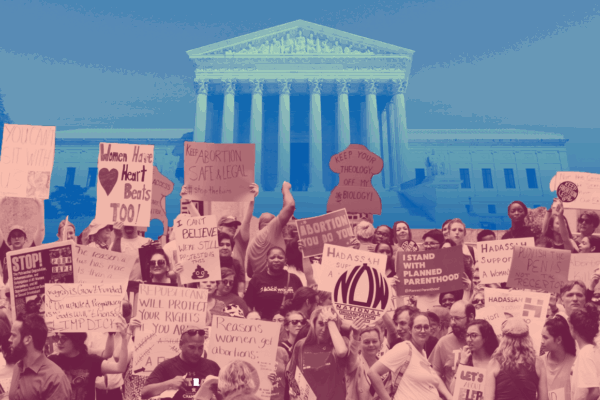Earlier this week, in the much anticipated June Medical Services v. Russo case, the Supreme Court struck down a Louisiana law that required abortion providers to have admitting privileges at hospitals within 30 miles of their abortion clinics.
While a law about admitting privileges might sound mundane at first, this restriction is known as a “TRAP law” — a targeted restriction on abortion providers. It is a restriction with no health benefits, intentionally designed to put abortion providers out of business. Had the Supreme Court upheld it, it would have closed all but one of the abortion clinics in the state.
If this sounds familiar, that’s because four years ago the Supreme Court ruled that a virtually identical Texas law, H.B. 2, was unconstitutional in a case called Whole Woman’s Health v. Hellerstedt.
Yet this week we found ourselves just one vote away from the Louisiana version being allowed to take effect. Our nation was one Supreme Court Justice’s vote away from effectively blocking access to abortion for most people in Louisiana, which would have sent a ripple effect to other states looking to do the same.
Thankfully, that didn’t happen. The June Medical ruling affirms the constitutional right to access abortion — a right that should never have been in question. But the long-term safety of the right to abortion remains far from secure, and it shows in the way the justices came to their conclusions.
Five justices, including the often-conservative Chief Justice John Roberts, voted to strike down the unconstitutional Louisiana law. Those five justices recognized that the Louisiana law was so similar to the Texas law that SCOTUS found unconstitutional in 2016, that respect for the precedent required the same outcome this time.
But Chief Justice Roberts wrote a separate opinion rather than joining in with the four traditionally liberal justices, making it clear that while the Louisiana law must be struck down because of the similar prior decision, he does not support the expansion of abortion rights and thinks the impact of abortion restrictions should be analyzed on a state-by-state basis. And then there were Justices Thomas, Alito, Gorsuch, and Kavanaugh who all wrote dissenting opinions. Justice Thomas even went so far as to write that he thinks the Constitution does not protect the right to access abortion at all.
If that sounds concerning, that’s because it should: SCOTUS made the right decision in this case, but the right to abortion remains in danger. The narrow ruling based just on the principle of stare decisis — the idea that precedent should apply in similar cases — means that future legal challenges to new kinds of abortion restrictions may not be so lucky. And while the June Medical decision doesn’t affect the status quo, our status quo concerning access to abortion care, especially in Texas, is not good.
Despite the fact that the majority of Texans, and Americans in general, support the legal right to abortion, in the past 10 years states have passed 483 laws that push abortion out of reach. In Texas, more than 40 anti-abortion bills were filed during the most recent legislative session in 2019, attempting to restrict people’s access to abortion care in one malicious way or another. There will likely be as many anti-abortion bills filed during the upcoming 2021 Texas State Legislative session.
Not only are these restrictions unnecessary — abortion is 14 times safer than childbirth — the restrictions are also dangerous. The people most affected by abortion restrictions are people who already face the greatest obstacles in accessing health care: people living on low incomes, people of color, young people, LGBTQ+ people, people from immigrant communities, and people from rural communities. By denying access to abortion care, hostile state governments like Texas exacerbate already horrible systemic inequities.
If unnecessary abortion restrictions continue to make it harder for people to get the care they need, the constitutional right to abortion will exist in name only. This July during the primary run-off elections and this November during the general election, we have to vote up and down the ballot like our reproductive rights depend on it — because they do.
We simply can’t wait and see whether the courts will make the right judgments on abortion each time they are confronted with the issue. Help us keep abortion safe and legal; make the pledge to protect abortion care today.


